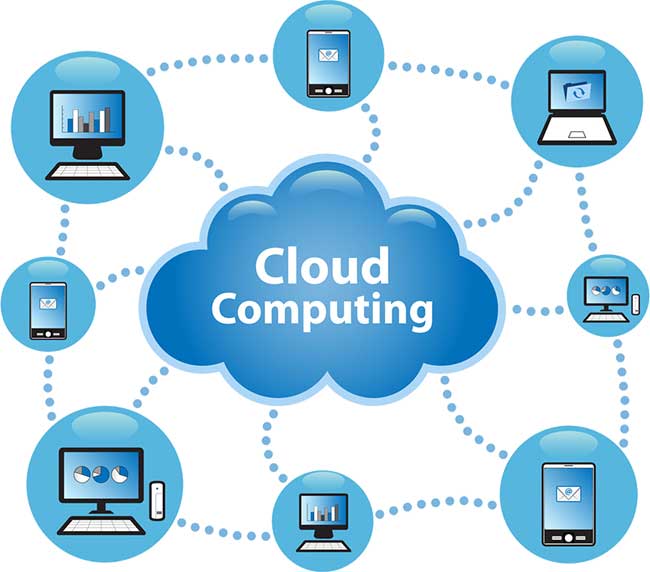The case for implementing cloud computing in businesses large and small continues to gain ground, especially in the areas of data backup and protection. Cloud computing has proven to be a particularly viable solution for businesses seeking protection from data loss resulting from data theft, malfunctioned drives, virus attacks and unforeseen disasters. Furthermore, it eliminates data backup worries, incessant software updates and skyrocketing hardware maintenance costs.
What is Cloud Computing?
Cloud computing refers to computing that allows users to take advantage of internet infrastructure to derive benefits from specialized servers and associated services physically located far away from their own premises. The word cloud denotes the fact that most cloud systems use remote infrastructure to facilitate distribution of services and resources.
Cloud computing services falls into three broad categories:
- Hardware-as-a-Service
- Software-as-a-Service
- Infrastructure-as-a-Service
Hardware-as-a-service (HaaS) refers to a cloud service whereby the owner of a given hardware such as a server, allows another person or organization to fully or partially use it over the cloud. Such services include Dedicated Servers, Cloud Hosting and Virtual Private Servers.
Software-as-a-Service (SaaS) refers to a cloud service whereby the software owner allows another person or organization to use specific software over the cloud. All web-based software whereby the user utilizes them online without downloading them or installing them offline are considered SaaS solutions. Examples of SaaS include BaseCamp, Commindware, Daptiv, Worketc, Quickbooks Online, etc.
Infrastructure-as-a-Service (IaaS) refers to a cloud service whereby the owner of a given infrastructure allows another person or organization to use the said infrastructure over the cloud. This infrastructure basically comprises of a combination of both HaaS and SaaS. Examples of IaaS include Amazon Web Services, Google Cloud, Serverpronto, etc.
Why Cloud Computing?
Cloud computing is often the preferred way of computing for personal as well as enterprise use for the following reasons:
- Security – Cloud computing allows data to be stored across multiple servers with high security levels such that it would almost be impossible to lose data.
- Specialization – Very few enterprises have skilled manpower to run the kind of infrastructure provided by cloud computing. Therefore, it is better for enterprises to specialize in their core functions while letting cloud service providers specialize in handling their IT functions.
- Long-run Economics – Cloud computing is more economical in the long-run as enterprises save on the capital outlay required to acquire complex servers, employ and retain a highly specialized team of IT professionals and maintain the computing infrastructure. Due to the economies of scale derived by Cloud Service Providers that have many clients across the globe and shared infrastructure, it proves to be a very cost effective solution for enterprises
- Technical Efficiency – It is much easier to maintain servers and data in a cloud than locally. This is because of the technical infrastructural advantages that are only feasible with a cloud computing environment such as multiple server backups, automatic file versioning, global distribution, global accessibility, etc.
- Less Susceptible to Local Physical Constraints– Constraints like small office space, lack of adequate ventilation for the servers, power irregularities, etc. do not hinder cloud computing since servers are distributed in various locations. Physical risks and constrains become almost non-existent.
- Improved Accessibility – Cloud computing allows data and information to be accessed from anywhere around the globe, providing around the clock data availability
- Promotes a 24/7 Economy– Cloud computing allows an individual or enterprise to take advantage of different geographical time zones to ensure that critical resources such as labor are effectively utilized around the clock.
- Boosts Resource Utilization – With Cloud computing, there is no wastage of critical resources such, as servers, resulting from idleness due to limited office hours. There is also no wastage of time and resources resulting from run-down servers. Furthermore, time and effort is saved because routine and laborious work such as backing up data, scanning computers for viruses and servicing broken computers is left to the cloud.
The benefits of Cloud computing are immense. Those highlighted above are a few of many. There is no doubt that the efficiency and effectiveness of business operations would easily be felt by all stakeholders by switching to Cloud computing. Customers, as key stakeholders, enjoy prompt and quality service delivery. Employees, as the next key stakeholders, enjoy flexibility and efficiency of a hassle-free cloud working environment. Finally, you, as the business entrepreneur, would reap maximum returns on your technology investment.
Article contributed by Silicus Technologies